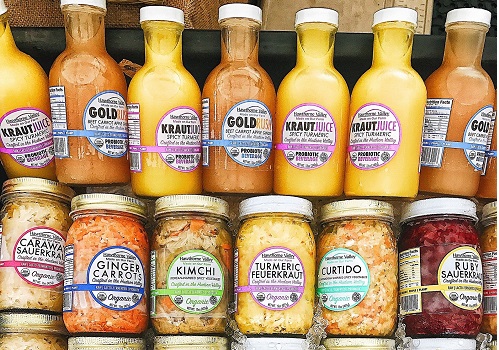Whitethorne LLC, a project of Hawthorne Valley Association, is a new business in Hudson, NY, that produces and sells fermented and probiotic foods and beverages under the Hawthorne Valley brand, as well as co-packs products for other companies, including Sauerkraut Seth’s and Poor Devil Pepper Co. The business was created through the collaboration of Hawthorne Valley, RSF Social Finance, and a group of impact investors committed to investing in projects that help build the regional organic food system in the Hudson Valley.
Hawthorne Valley’s entrée into the fermented food business began inconspicuously enough: a one-page proposal typed up and brought to a meeting by Seth Travins, an apprentice at Hawthorne Valley Farm. He proposed to use 300 pounds of cabbage from the year’s harvest to create a small batch of sauerkraut to sell at the farm’s onsite store and Greenmarket stands in Manhattan. The year was 1999.
To some in the room, Travins’ proposal seemed liked a long-shot. True, cultures across the world had been making fermented foods for millennia, both as a way to preserve the harvest and to increase the bioavailability of nutrients in the foods themselves. And, some of the most popular foods and drink in the world are fermented: cheese, sourdough bread, beer, wine, salami, kimchi.
But sauerkraut? Wasn’t it just a barbecue condiment? Despite their reservations, the group said, yes, and Travins got to work.
Flash forward to 18 years later…Travins had left the farm, and was making and selling the popular Sauerkraut Seth’s products. Hawthorne Valley’s line of fermented products was being sold in health food stores across the Northeast. The farm was incubating a new brand of fermented hot sauce created by production manager Jared Schwartz and his wife Laura Webster under the Poor Devil Pepper Company name.
All three brands were performing well. With increasing consumer awareness about the importance of gut health, raw, unpasteurized, fermented foods like kraut and kimchi had suddenly become trendy and were becoming a regular part of people’s diets. No longer relegated to the cookout side dish table, the foods were appearing everywhere, and Hawthorne Valley’s Instagram feed was flooded with recipe ideas (avocado toast with caraway kraut, kale and quinoa salad with ruby kraut, kimchi frittatas, roast salmon and turmeric kraut).
Larger customers were knocking on Hawthorne Valley’s doors, but they had outgrown their production spaces and were considering what to do next. They saw the opportunity to make an ambitious leap that would hopefully benefit all three companies, and also make a meaningful difference to the local and regional farmers and growers who supply the fresh produce for their ferments.
With the help of values-aligned lenders and investors, the project moved forward, and the Hudson Valley’s newest fermented foods facility opened in November under the auspices of Whitethorne, LLC.
The financing from San Francisco–based RSF includes a $900,000 mortgage on a new production facility in Hudson, New York; a $300,000 term loan for facility upgrades; and a $360,000 equipment loan. The building improvement financing is the first loan from RSF’s Biodynamics Capital Collaborative, a gift-money fund that supports the biodynamics movement, considered the next step beyond organics.
“The Biodynamics Capital Collaborative was key to getting HVA the full amount of financing they needed—because the Collaborative is a philanthropic fund, it allows us to take on some additional risk,” explains Kate Danaher, senior director of social enterprise lending and integrated capital at RSF. “The match was there because Whitethorne sources cabbage from HVA’s own 900-acre biodynamic farm as well as Hudson Valley organic farmers, and the growing business will create more demand for biodynamic produce.”
Danaher added that the financing is a great example of RSF’s integrated capital approach, which combines various forms of financial and nonfinancial capital to support pioneering social enterprises. The mortgage loan comes from RSF’s flagship Social Investment Fund and the equipment loan is from RSF’s Food System Transformation Fund, an investment fund for foundations and accredited investors.
“This is an important development for Hawthorne Valley,” said Martin Ping, Hawthorne Valley Association’s executive director. “The original production space was bursting at the seams, and it is gratifying to see the ferments have the space they need to grow in order to better support the local and regional farmers through purchasing ingredients, and to generate additional income in support of Hawthorne Valley’s educational, research, and cultural programs.”
The new company has set to work on a number of goals: scaling up production while preserving the small-batch, high-quality integrity of their products; increasing purchasing from local farmers and deepening working relationships with all organic growers in the region; and increasing consumer interest in fermented foods.
To learn more about Whitethorne, click here
About Hawthorne Valley Association
HVA is a diverse nonprofit in Ghent, New York, located in Columbia County in the Hudson Valley. It is committed to social and cultural renewal through education, agriculture, the arts and research. HVA’s integrated learning campus is embedded in a 900-acre Biodynamic® farm and includes a Waldorf school; on-farm education programs; a full-line organic and natural foods and grocery store; social, ecological and cultural research groups; teacher education programs; arts initiatives; and more. For additional information, please visit https://hawthornevalley.org. Follow us on Instagram @hawthornevalley.
About RSF Social Finance
RSF Social Finance offers innovative opportunities to invest, give and get funding that generate positive social, economic and ecological impact. Since 1984, RSF has made over $450 million in loans, grants and investments supporting social enterprises in the areas of food and agriculture, education and the arts, and ecological stewardship. Find out more about how RSF connects social entrepreneurs with diverse forms of capital. Follow @RSFSocFinance.

